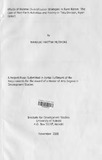| dc.contributor.author | Wanjuki, Martha M | |
| dc.date.accessioned | 2013-05-21T06:12:51Z | |
| dc.date.available | 2013-05-21T06:12:51Z | |
| dc.date.issued | 2008 | |
| dc.identifier.citation | A Project Paper Submitted in Partial Fulfilment of the Requirements for the Award of a Master of Arts Degree in Development Studies | en |
| dc.identifier.uri | http://erepository.uonbi.ac.ke:8080/xmlui/handle/123456789/24006 | |
| dc.description.abstract | This study investigates the effects of income diversification strategies in rural Kenya.
It focuses on the non-farm activities and poverty in Tetu division, Nyeri district. The
study is based on both primary and secondary data. Secondary data was obtained
through reviewing relevant literature while primary data was collected using
quantitative and qualitative approaches. A survey was conducted in the sampled
households through interviews using questionnaires. Also, key informants and
chronically poor households were interviewed and the observation method was used
where appropriate.
The findings of the study show that the types of non-farm activities that are carried
out in the study area vary with households socio-economic characteristics such as
income and education. Also, participation in the activities was found to relate with a
households poverty status. The chronically poor households participate in non-farm
activities that earn them very low incomes and are inadequate in uplifting them from
the poverty status.
In line with the findings, the study makes recommendations for promotion of the rural
non-farm sector and productive activities. This can be achieved by addressing factors
that hinder households' participation in productive activities through interventions
such as easing access to credit, and promoting acquisition of skills in entrepreneurship
and education beyond the primary level. Rural development efforts should strive to
balance attention to both the farm and non-farm sector and foster productive linkages.
o
The study also recommends development and implementation of strategies that will
help the chronically poor households participate in activities that have a potential of
uplifting them from the poverty status effectively. Such activities should yield high
and stable incomes. Antipoverty programmes should identify the specific needs of the
chronically poor and target them. | en |
| dc.language.iso | en | en |
| dc.title | Effects of income diversification strategies in Rural Kenya: The case of non-farm activities and poverty in Tetu Division, Nyeri District | en |
| dc.type | Thesis | en |
| local.publisher | Arts-Development studies | en |

